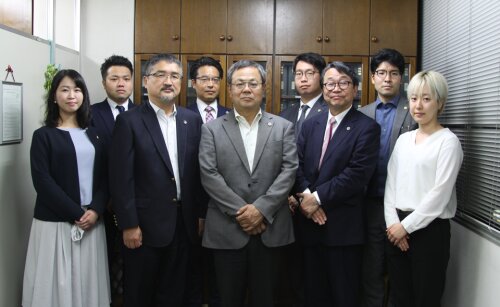Best Wage & Hour Lawyers in Shizuoka
Share your needs with us, get contacted by law firms.
Free. Takes 2 min.
List of the best lawyers in Shizuoka, Japan
About Wage & Hour Law in Shizuoka, Japan
Wage and hour issues in Shizuoka are governed primarily by national legislation such as the Labor Standards Act and by prefectural rules like the Shizuoka Prefectural Minimum Wage. These laws set basic standards for working hours, overtime premiums, minimum wages, paid leave, record keeping, and employer obligations. Local enforcement is handled by offices such as the Labor Standards Inspection Office and the Shizuoka Labor Bureau. Whether you are a regular employee, part-time worker, contract worker, or a foreign national, these rules affect pay, working time, holiday pay, and protections against unlawful deductions or retaliation.
Why You May Need a Lawyer
Labor and wage matters can be technical and emotionally stressful. You may need a lawyer when:
- Your employer refuses to pay overtime, holiday pay, or unpaid wages.
- You face unlawful deductions from your salary or unclear pay calculations.
- You were subject to wrongful dismissal, forced resignation, or retaliation after complaining about wages or working hours.
- Your workplace lacks required work-hour records or refuses to provide payslips and contracts.
- You are negotiating a settlement, severance, or a back-pay claim and want to ensure legal protections and accurate calculations.
- You are an employer seeking compliance advice to avoid disputes and penalties.
Local Laws Overview
Key aspects of wage and hour law applicable in Shizuoka include:
- Statutory working hours: The general standard under the Labor Standards Act is eight hours per day and 40 hours per week. Employers must not regularly exceed these limits without proper overtime agreements.
- Overtime and premium pay: Work beyond statutory hours generally requires overtime pay. Employers must conclude and file an Article 36 agreement - commonly called a 36-agreement - with the Labor Standards Inspection Office to lawfully require overtime and holiday work. Overtime, late-night work, and statutory holiday work require additional pay at legally prescribed premium rates, and premiums may be cumulative when multiple categories apply.
- Minimum wage: Shizuoka Prefecture sets a regional minimum wage that employers must pay. The minimum wage is updated periodically, so the applicable rate depends on the relevant year and pay period.
- Paid annual leave: Employees who meet attendance and length-of-service requirements are entitled to statutory paid annual leave. The entitlement increases with continuous service.
- Work-style reform and overtime limits: Recent national reforms aim to limit excessive overtime and require stricter compliance by employers. These reforms introduced statutory caps and stronger enforcement tools, so employers and employees should be aware of new limits and reporting obligations.
- Record keeping and payslips: Employers must keep accurate records of working hours, wages, and other employment terms. Employees are generally entitled to receive pay statements showing calculation of wages and deductions.
- Enforcement and remedies: Violations can be addressed through administrative complaints to the Labor Standards Inspection Office, mediation at labor tribunals, civil litigation for unpaid wages, or criminal prosecution in severe cases.
Frequently Asked Questions
What are the standard working hours in Shizuoka?
The standard statutory working hours under national law are eight hours per day and 40 hours per week. These standards apply throughout Japan, including Shizuoka. Any regular work beyond these hours is considered overtime unless a specific exception applies.
How is overtime paid?
Overtime work normally requires a premium on top of the base hourly wage. Employers must have a valid Article 36 agreement in place to request overtime. Premium rates vary by type of overtime such as late-night work or holiday work. When multiple premiums apply, they are generally added together. Exact calculations depend on the employment contract and applicable laws.
What is the minimum wage in Shizuoka?
Shizuoka Prefecture sets a regional minimum wage that applies to most workers in the prefecture. The minimum wage is reviewed and revised periodically. If you are unsure of the current rate for your working period, check with the prefectural labor authorities or consult a lawyer or labor counselor.
Can my employer make deductions from my wages?
Deductions from wages are tightly regulated. Employers cannot make arbitrary or unlawful deductions. Permitted deductions generally include taxes, social insurance contributions, and other items agreed in writing or provided for by law. If deductions appear unlawful or unexplained, document the pay statements and consult a lawyer or the Labor Standards Inspection Office.
What should I do if I am not being paid overtime or proper wages?
Start by collecting evidence: payslips, employment contract, timecards, emails, schedules, and witness statements. Raise the issue with your employer in writing if possible. If the employer does not remedy the situation, file a complaint with the Labor Standards Inspection Office, seek mediation through labor dispute mechanisms, or consult a labor lawyer to consider civil action for unpaid wages.
Are part-time and fixed-term workers covered by these laws?
Yes. Part-time, fixed-term, dispatch, and other non-regular workers are entitled to protections under labor law, including minimum wage, overtime rules when applicable, and basic employment protections. Some entitlements may be pro-rated according to working hours. Employers must treat non-regular workers fairly and in compliance with law.
What protections exist if I complain about wage violations?
Japanese law prohibits unfair dismissal and retaliation for asserting labor rights. If an employer dismisses or penalizes you for complaining about wages or working conditions, you may have a claim for unfair dismissal or labor-management dispute. Promptly document any retaliatory acts and consult a lawyer or the Labor Standards Inspection Office.
How long do I have to claim unpaid wages?
There are statutory time limits and procedural rules for wage claims. Time limits can affect available remedies, and evidence may become harder to obtain over time. Because deadlines and procedures vary by claim type, act promptly and seek legal or administrative advice as soon as possible.
Can foreign workers get help in Shizuoka?
Yes. Foreign national workers are protected by Japanese labor law. If you have difficulty communicating in Japanese, ask for interpretation support at relevant offices or seek legal assistance from lawyers and organizations offering services in your language. Keep all employment documents and records, and report violations to authorities if necessary.
What outcomes can I expect from a wage dispute?
Possible outcomes include informal employer payment of back wages, administrative orders from the Labor Standards Inspection Office, mediated settlements, awards from labor tribunals, civil court judgments ordering payment, and in serious cases, criminal punishment for employer violations. The best outcome depends on the facts, strength of evidence, and whether you pursue negotiation, administrative complaint, or litigation.
Additional Resources
Organizations and offices that can assist with wage and hour issues in Shizuoka include local Labor Standards Inspection Offices, the Shizuoka Labor Bureau, the prefectural office that issues minimum wage notices, the Shizuoka Bar Association for lawyer referrals, and national resources such as the Japan Legal Support Center - Houterasu - which provides information and possible financial support for legal consultations. Local labor unions and worker support centers can also provide advice and advocacy. If you are a foreign national, local government multicultural support centers may offer language assistance for dealing with authorities.
Next Steps
If you believe your wage or hour rights have been violated, follow these steps:
- Gather evidence: payslips, time records, employment contract, emails, messages, and witness names.
- Check your contract and any company rules regarding working hours, overtime, and pay calculations.
- Attempt an internal resolution: raise the issue in writing with HR or management, and keep records of all communications.
- Contact the Labor Standards Inspection Office to file a complaint or seek guidance about enforcement and administrative remedies.
- If the issue is not resolved, consult a lawyer who specializes in labor law. Ask about initial consultation fees, possible contingency arrangements, and likely timeframes for administrative or court action.
- Consider mediation or filing claims with labor tribunals as alternatives to full litigation. If you have limited funds, ask about legal aid programs via Houterasu.
Acting promptly and preserving documents will improve your chances of a favorable resolution. A specialized labor lawyer can help you evaluate options, calculate unpaid amounts, and represent you in negotiations or proceedings.
Lawzana helps you find the best lawyers and law firms in Shizuoka through a curated and pre-screened list of qualified legal professionals. Our platform offers rankings and detailed profiles of attorneys and law firms, allowing you to compare based on practice areas, including Wage & Hour, experience, and client feedback.
Each profile includes a description of the firm's areas of practice, client reviews, team members and partners, year of establishment, spoken languages, office locations, contact information, social media presence, and any published articles or resources. Most firms on our platform speak English and are experienced in both local and international legal matters.
Get a quote from top-rated law firms in Shizuoka, Japan — quickly, securely, and without unnecessary hassle.
Disclaimer:
The information provided on this page is for general informational purposes only and does not constitute legal advice. While we strive to ensure the accuracy and relevance of the content, legal information may change over time, and interpretations of the law can vary. You should always consult with a qualified legal professional for advice specific to your situation.
We disclaim all liability for actions taken or not taken based on the content of this page. If you believe any information is incorrect or outdated, please contact us, and we will review and update it where appropriate.










